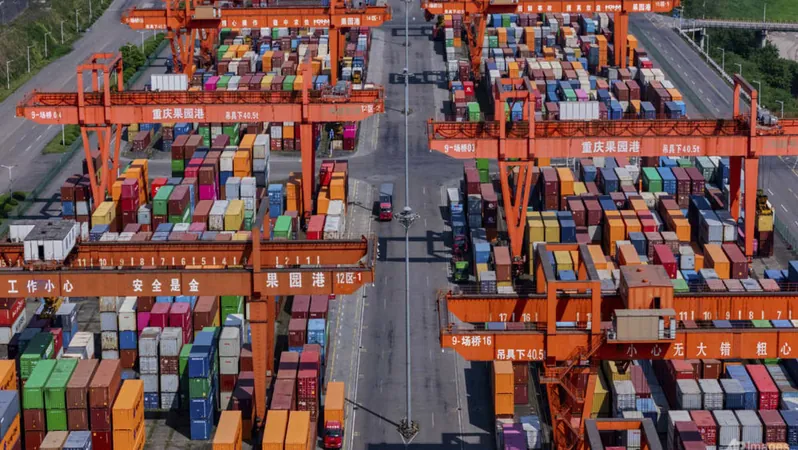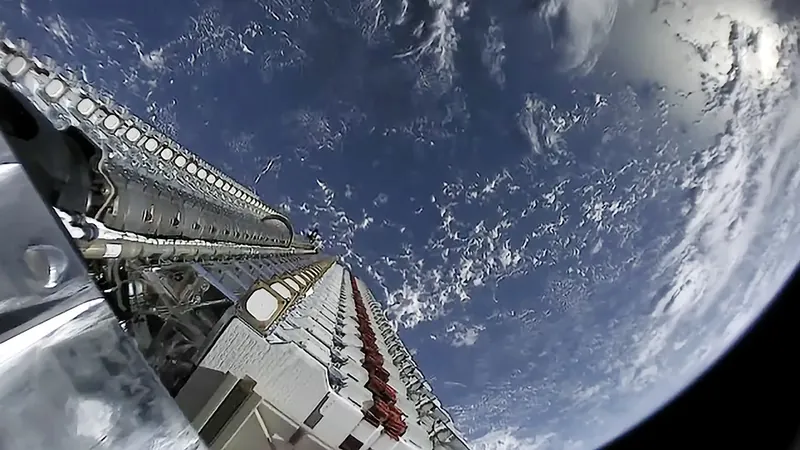
China Eases US Tariffs: A Move to Mitigate Trade War Fallout
2025-04-25
Author: Li
In a surprising twist in the ongoing trade war, China has rolled out exemptions on US imports from its hefty 125% tariffs. This initiative comes as the government reaches out to businesses, urging them to identify goods that could benefit from these exemptions, signaling Beijing's growing concern over the economic repercussions of the conflict with Washington.
This latest development suggests that the globe’s two largest economies are actively seeking ways to ease tensions, lifting fears regarding the adverse effects of the tariff impositions. The prospect of broader tariff relief is gaining traction in various industries, as a more cooperative tone from the United States nudges the US dollar higher and boosts stock markets in Hong Kong and Japan.
A dedicated task force from the Ministry of Commerce is now collecting lists of products eligible for tariff exemptions, urging companies to submit their requests. Michael Hart, president of the American Chamber of Commerce in China, highlighted that the Chinese government is particularly interested in understanding which US imports are unique to particular supply chains.
Excitingly, some companies have already benefited; the CEO of French aircraft engine giant Safran disclosed that they received notice of exemptions for several aerospace components, including engines and landing gear.
Additionally, a meeting was held by China’s Ministry of Commerce with over 80 foreign firms and business councils to discuss the impacts of US tariffs on investments and foreign operations within the country. These tariff exemptions could provide much-needed relief across sectors—from pharmaceuticals to airlines—by reducing costs on essential imports such as semiconductors and petrochemicals. This strategic move could also alleviate pressure on US exports, particularly as indications emerge that the Trump administration is keen on brokering a deal.
The European Union Chamber of Commerce in China has also engaged with the commerce ministry regarding tariff exemptions, echoing worries from its members about the significant impact of these tariffs on critical imported components.
A list detailing 131 product categories under consideration for exemptions has been circulating on Chinese social media and among trade groups, including items from vaccines to aircraft engines. Notably, this list corresponds to an estimated $45 billion worth of imports into China last year.
Despite the mounting pressure, the US maintains that this trade standoff is unsustainable economically. Although some electronic goods have been granted tariff exemptions, China is resolute in its stance, warning that it is ready to battle until the US retracts its 145% tariffs.
Yet, challenges loom large for China's economy, with increasing unemployment, deflationary pressures, and a backlog of unsold goods raising concerns about future price drops. While China celebrated a nearly $1 trillion trade surplus in 2024, it remains heavily reliant on the US for vital imports, such as ethane for plastics and pharmaceuticals.
As the world watches closely, major pharmaceutical entities like AstraZeneca and GSK emphasize their dependence on US manufacturing for drugs sold in China, highlighting the interconnectedness that exists even amidst escalating tensions.



 Brasil (PT)
Brasil (PT)
 Canada (EN)
Canada (EN)
 Chile (ES)
Chile (ES)
 Česko (CS)
Česko (CS)
 대한민국 (KO)
대한민국 (KO)
 España (ES)
España (ES)
 France (FR)
France (FR)
 Hong Kong (EN)
Hong Kong (EN)
 Italia (IT)
Italia (IT)
 日本 (JA)
日本 (JA)
 Magyarország (HU)
Magyarország (HU)
 Norge (NO)
Norge (NO)
 Polska (PL)
Polska (PL)
 Schweiz (DE)
Schweiz (DE)
 Singapore (EN)
Singapore (EN)
 Sverige (SV)
Sverige (SV)
 Suomi (FI)
Suomi (FI)
 Türkiye (TR)
Türkiye (TR)
 الإمارات العربية المتحدة (AR)
الإمارات العربية المتحدة (AR)